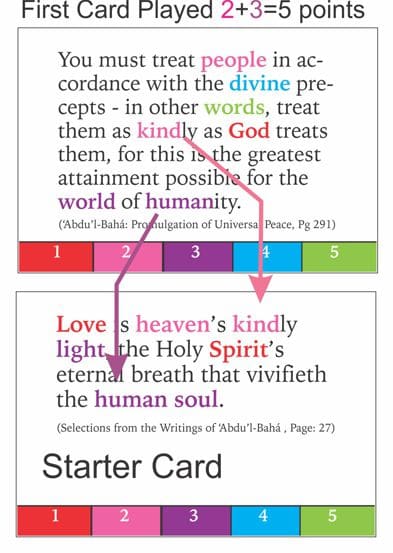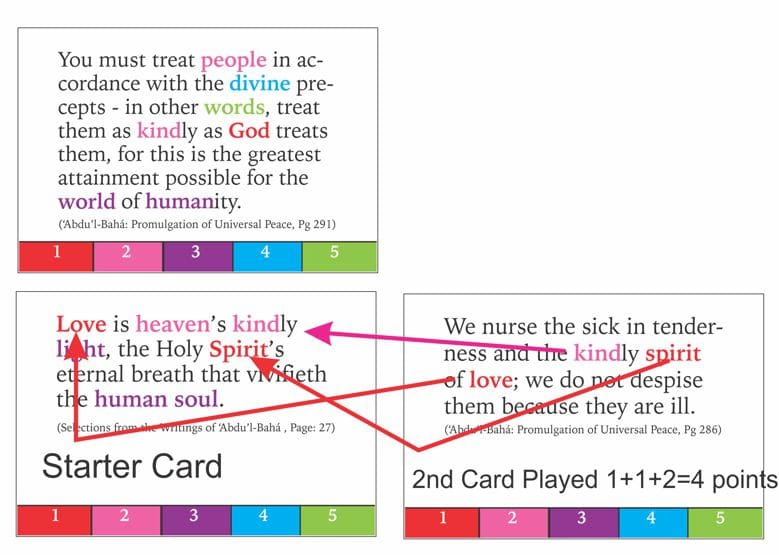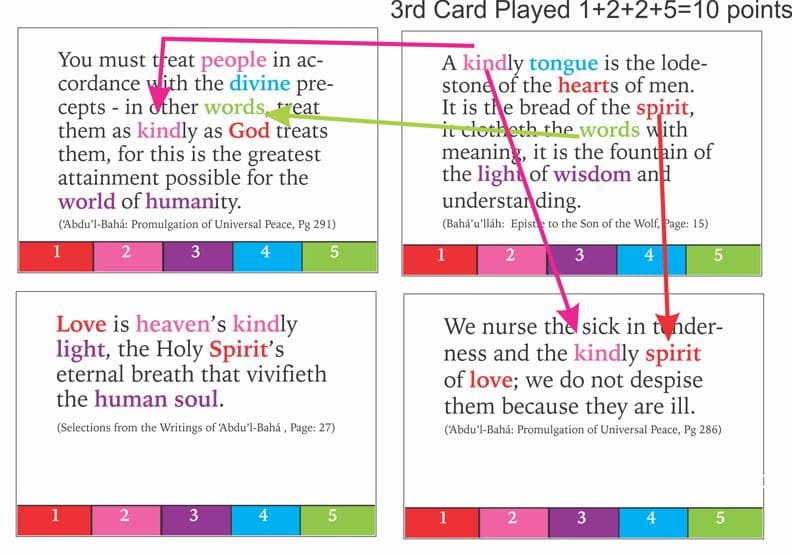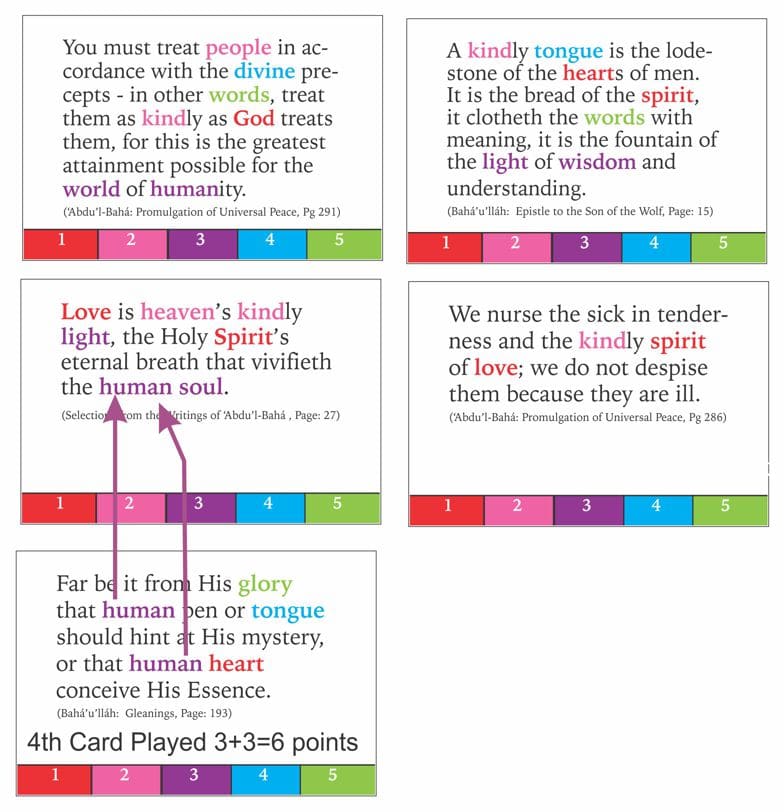Here is the information that you will find on the instruction sheet in the pouch along with your cards, plus some extra clarification.
We will add instructions for additional variations as we create them, or as people send their ideas. We will also add clarification as people ask questions or try new ways to cheat ;)
The Bahá’í Writings contain many repeating themes and words. Finding those common words on the Scrabinoes cards earns you points. The more connections you can find, the more points you earn. Color coding makes it easy. Multi-directional play makes it challenging.
What you need:
1) A deck of Scrabinoes cards,
2) A large table that is well-lit so you can read the words and distinguish their colors,
3) A pad & pencil to record your points.
4) 1-6 players Ages 10 and up.
With more than 6 players, form teams.
The Goal:
Earn points by playing a quotation card from your hand beside a card on the table that contains at least one word (or partial word) in common with it. The more words the quotations have in common, the more points you earn. The fewer times the word is used in the deck, the more that word is worth. Each word that can earn points is color-coded to the number of points it is worth. Cards can be played along any edge of the matching card, and cards can create a grid in which words can score points in more than one direction. Cards must have at least one word in common with every card they touch.
How to play multi-player Scrabinoes:
Deal five cards to each player. The remaining cards become the draw pile. Take the top card from the draw pile and place it in the middle of the play area. Choose who goes first. First player lays down a card that contains at least one color-coded word in common with the center card.
Line any edge of the card up beside any edge of the center card. Total the points earned. Player one draws a new card from the draw pile. Then play moves to the left. If a player is unable to play any card in their hand, they may pass.
The second player can play a card along any edge of either of the two cards in play, as long as at least one word matches that card. Player three can play a card along any edge of all THREE cards on the table. As play progresses, the cards will form an open grid. A card may touch two, three or four other cards as long as it shares at least one word in common with every card that it touches.
Scoring:
For every colored word that the cards have in common, you earn points. Use the color coding to determine the number of points each word is worth. The point value is at the bottom of each card, with red words worth one point, pink worth two, etc. Note, both the color and the word (or partial word) have to match.
When the card played touches more than one other card, points are scored in each direction independently. If the same word is common to more than one adjacent card, then that word earns points for each card that it touches. Add the point score for each matching word in each adjacent card. If a card uses the same word twice, it scores twice.

Here is an example of a starter card, drawn from the top of the deck and placed in the middle of the table, followed by the first player’s first card. You can see that the first card earns two points for the pink partial-word “kind” and three points for the purple partial word “human” for a total of five points.

The second player scores one point for the red “spirit,” one point for the red “love” and two points for the pink partial word “kind” for a total of four points.

The third player is now able to score in two directions, earning one point for the red “spirit,” two points for the pink “kind” in each direction, and five points for the green “words” for a total of ten points. Note: this card CANNOT score off the starter card, going diagonally, even though they both have the word “spirit.” Diagonals don’t count.

Here you can see that, because the fourth card has the purple word “human” twice, it scores three points twice. Note, however, that if someone were to play a card with the word “human” on it beside this one, it would only score three points if the word “human” appeared once, and six points if the word human appeared twice. The score would not be doubled just because the card being played ON has the word twice.
Also note that this card can’t be played across both of the two cards at the top of this set to earn points from both cards even though it has the words “human” from the first card played and “heart” from the second card played. There is no spanning cracks. The full edge must line up with the full edge of each card.
Educational Variation:
Encourage each player to read the quotation on their card out loud as they play it.
Five-Card Shorthand Variation:
For a quick-playing variation, deal 5 cards to each player and don’t use a draw pile. Players can pass on their turn, but when one player runs out of cards, every other player has one last chance to play a single card. For any card left in a player’s hand, subtract the highest value word’s points from their score.
Advanced Strategy Variation: Each player has the option of taking two turns in a row, as long as the two cards played touch each other. This variation slows down play, but increases the amount of strategy involved.
Philosophical Variation: Discuss the relationship between the quotations and the subtle differences that the words have in their different contexts. (This version can go on for years.)
Seven Valleys Variation:
There are 49 cards, so you can restrict play to a 7×7 grid. The first card does NOT have to stay in the center. Play ends when all 49 cards are played, or there are no plays to be made that stay within the grid.
Solitaire/Cooperative Variation: Scrabinoes can be played alone or as a single team just to see how many points you can score. If you play the Seven Valley variation, then add 50 points if you play all 49 cards within the 7×7 grid.
Additional variations such as “Go Fish” and “Play God” versions, will be added as we figure them out!
If you make up your own games using these versatile cards please send us the rules.
Also check out our other fun games and activities including:
Flash of Inspiration Flash Cards
Quintessence Playing Cards
Life Dice Conversation Cubes
Animals Building Character
Coloring & Activities Book
ABC Virtues Refrigerator Magnets
Also:
Watch for these forthcoming games:
Interfaith Scrabinoes
Virtues Scrabinoes
New Testament Scrabinoes

